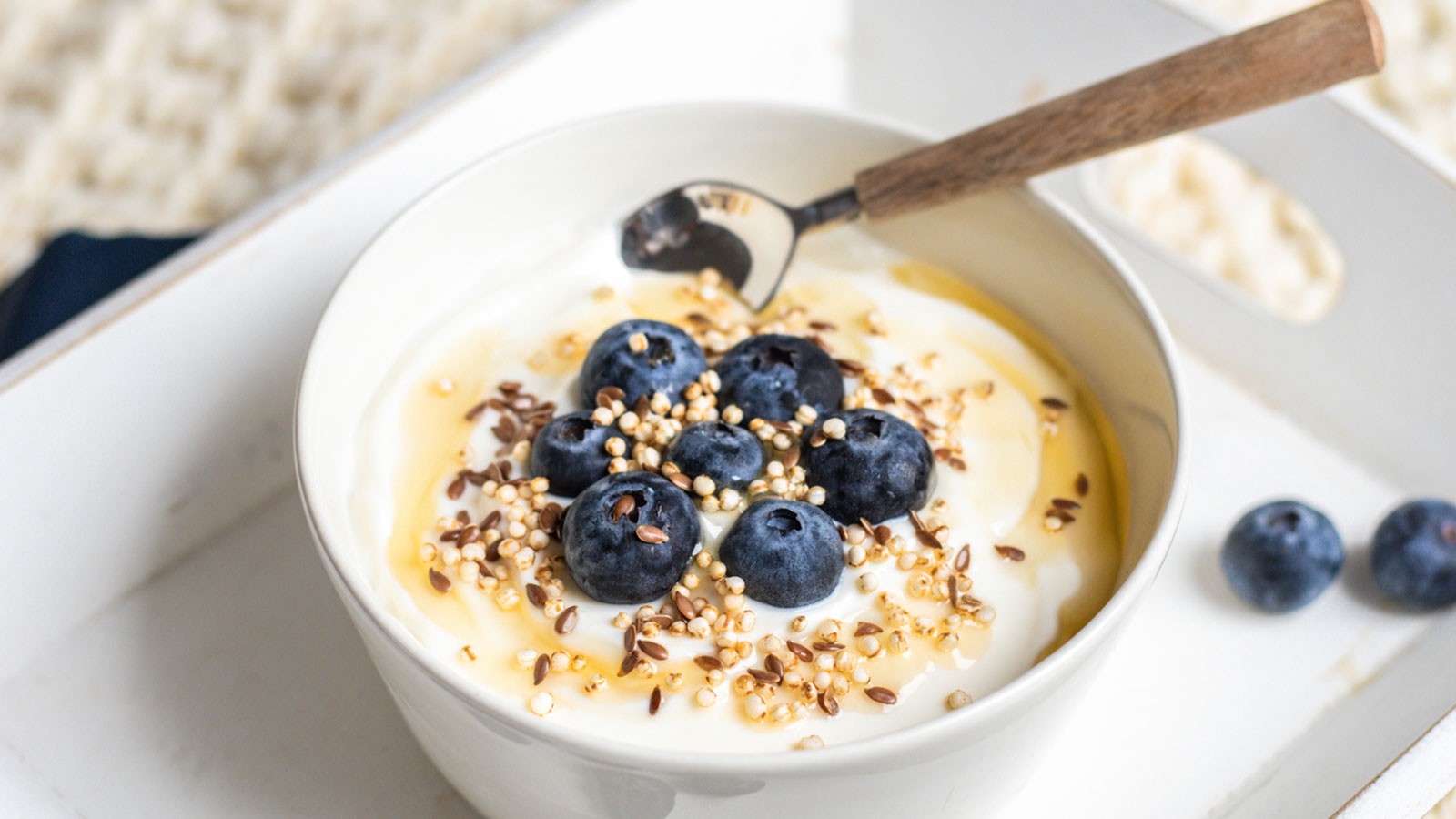WellnessVerge is reader-supported. We may earn a commission when you make a purchase through the links on this page. Learn more about our process here.
The Importance of Probiotics for Digestive and Overall Health
Last Updated on February 12, 2024
Dietitian Reviewed Natalie Olsen, MS, RDN
Consuming probiotics in food and supplements can play a big role in improving the health of your gut. This article discusses the role of probiotics and prebiotics in overall wellness, including digestive health, and gives recommendations for including them through foods and supplements.


Key Highlights
- Probiotics contain live bacteria that can improve health by balancing gut microbiome composition. Common probiotic strains are from Lactobacillus and Bifidobacterium bacteria.
- Probiotics may strengthen immunity, improve digestion, support heart and skin health, aid weight loss, and benefit mental health and mood.
- Probiotics occur naturally in fermented foods like yogurt, kimchi, kombucha, and kefir. You can also take probiotic supplements for higher doses.
- Prebiotics are non-digestible carbs that provide fuel for probiotics to grow. Food sources include asparagus, garlic, onion, banana, and wheat.
- Probiotics are generally safe, but immune-compromised people should use caution and consult a doctor before using them.
The Basics of Probiotics
An abundance of research reports that the health of your gut impacts the health of the rest of your body.
Probiotics are a class of live microorganisms that can have health benefits when ingested by your body. (1)
There are trillions of bacteria in your body. (2) Probiotics primarily live in your gastrointestinal tract, specifically your large intestine and colon.
However, many other locations on your body can also host probiotics. These may include your skin, lungs, urinary tract, mouth, and the vagina. (3)
Probiotics work by helping to balance out the mixture of helpful and harmful bacteria in your body, known as your gut microbiome. (4) This helps create a favorable environment for your digestive system.
When the gut microbiome is not balanced, and there are too many harmful bacteria, a condition called dysbiosis can develop. Dysbiosis is linked to various negative symptoms like bloating, flatulence, brain fog, mood changes, and nutrient deficiencies, as well as health conditions like inflammatory diseases and autoimmune disorders. (5)
So, getting enough probiotics is important to help support overall wellness.
There are many different types of probiotics, known as probiotic strains.
Probiotics are typically from bacteria or yeast. The most common types belong to the Lactobacillus and Bifidobacterium strains, which are from bacteria.
Within these probiotic strains, there are even more varieties of probiotic sub-strains, such as Lactobacillus acidophilus and Bifidobacterium lactis.
An example of a probiotic yeast is Saccharomyces boularrdi. (6) Each variety serves a different and unique purpose.
What Are the Health Benefits of Probiotics?
While probiotics directly impact your gut microbe, their benefits extend far beyond gut health.
Some of the many ways that probiotics can support your health include:
Strengthening Your Immune System
This is one of the main ways that probiotics work in your body. Between 70%–80% of your body’s immune system cells are located in your gut. (7)
Because of this, many studies suggest that probiotics can help with both disease prevention and treatment, including viral infections such as the common cold. (8)
Helping to Manage Digestive Disorders
This may include irritable bowel syndrome (IBS) and inflammatory bowel diseases like Crohn’s and Ulcerative Colitis. (9, 10)
Probiotics may also support conditions like Short Bowel Syndrome, or simply symptoms such as gas, bloating, and constipation.
Supporting a Healthy Weight
The composition of bacteria in your microbiome influences the production of hormones that make you hungry and full. (11)
Therefore, introducing more probiotics may help with weight loss and help prevent obesity. (12)
In addition, having a high diversity of healthy bacteria has a preventive effect on long-term weight gain. (13)
Reducing the Negative Effects of Antibiotics
Antibiotics work by killing off bacteria that can cause disease in your body. However, they can also kill good bacteria in the process and disrupt your gut microbiota. (14)
This can come with negative health effects, such as antibiotic-associated diarrhea and a weakened immune system. Taking probiotics may help lessen these adverse effects. (15)
Improving Nutrient Absorption from Food
Probiotics may help your body absorb more micronutrients from food, such as calcium and iron. (16)
This is perhaps due to their beneficial effects on your digestive health and their role in improving the strength of your gut lining.
This function can benefit anyone, specifically people dealing with or at risk of malnutrition.
Supporting a Healthy Brain and Mood
Your gut and brain are connected by a pathway called the “gut-brain axis.” Thus, your gut's health can significantly impact how well your brain works, including functions such as memory and mood. (17, 18)
About 95% of the neurotransmitter serotonin, a brain chemical, is produced in your gut. (19)
Serotonin significantly impacts your sense of well-being and is often referred to as your body’s natural “feel good” chemical.
Because of this, studies have shown that having an unhealthy gut can contribute to a negative mental and emotional state. (20)
Taking probiotics may help improve symptoms of anxiety, depression, and other mental conditions, including Alzheimer’s and Autism. (21)
Protecting Against or Helping Manage Heart Conditions
Good bacteria in the gut are linked to improved blood pressure and cholesterol, which can affect heart disease risk. (22, 23)
Benefiting Skin Health
Researchers have identified a relationship between the gut and the skin called the gut-skin axis.
Having a healthy gut is important for improving skin disorders like eczema, psoriasis, rosacea, and acne.
For example, it has been shown that a decreased diversity of good bacteria in the gut is linked to psoriasis and general dysbiosis can contribute to the inflammatory response that influences acne. (24)
Food Sources of Probiotics
Food and supplements are the main ways to get probiotics into your body.
Fermented foods are the primary source of probiotics in the diet. This is because the process of fermentation produces lactic acid bacteria that function as probiotics. (25)
Some common sources of probiotic foods include: (26)
- Yogurt with live and active cultures
- Some types of raw cheeses
- Japanese miso
- Kimchi
- Tempeh
- Sauerkraut
- Kombucha
- Kefir
- Pickles
- Breast milk (27)
It is also becoming increasingly common for food manufacturers to add probiotic bacteria to foods that may not naturally contain them.
What Is the Difference Between Prebiotics and Probiotics?
Unlike probiotics, prebiotics are not a type of bacteria. Instead, prebiotics are an indigestible carbohydrate, also known as dietary fiber.
They are fermented in your gastrointestinal tract and broken down by your gut bacteria. The byproducts that result from prebiotic digestion serve as a form of fuel for probiotics. (28)
In other words, prebiotics stimulate the growth of probiotics. They become food for bacteria and other microbes in the gut.
It is important to have both prebiotics and probiotics for optimal health benefits.
Food Sources of Prebiotics
Some common sources of prebiotics include: (28)
- Asparagus
- Garlic
- Onion
- Chicory root
- Jerusalem artichoke
- Wheat
- Honey
- Banana
- Barley
- Breast and cow milk
- Beans
While all prebiotics are a type of fiber, not all food sources of dietary fiber serve as prebiotics. (29) Therefore, eating a diet high in both prebiotics and other sources of fiber benefits your digestive tract.
The combination is called a synbiotic when both prebiotics and probiotics are present in a meal or supplement. (30) Synbiotics are believed to provide the most benefits to human health.
Should I Take Probiotic Supplements?
Because of the increasing popularity of probiotics, their use as a dietary supplement has been growing significantly.
A recent study reported that the probiotic supplement industry is projected to reach 64 billion US dollars by the year 2023. (31)
This section will answer all the important questions about probiotic supplements so you can decide whether you'd benefit from adding such a supplement to your routine.
How Do You Know If You Need a Probiotic Supplement?
There is no exact way to know whether or not you need to take a probiotic supplement. Instead, the decision is ultimately up to you and a trusted healthcare professional you may be working with.
Probiotic supplements often provide much larger quantities and different strains of beneficial bacteria than what could be obtained from food. This is why many people choose to take supplements instead of or in addition to getting probiotics in their diet.
People who choose to take probiotic supplements are typically those with a health condition that has shown to benefit from probiotics, such as the health benefits described above, or who are wanting to help prevent illness.
Are Probiotic Supplements Effective?
Not all probiotic supplements are created equally. Different types of probiotic strains have different functions in the body.
For example, some strains may have a more significant role in the immune system, while others may have a greater impact on digestion.
This is why it is important to do your research and talk with a trusted healthcare professional before deciding on which type of probiotic supplement to take.
Probiotic supplements often contain multiple strains of bacteria in one supplement. This may be your best bet to cover multiple bases and potentially get the best results.
In addition, it is also helpful to know the potency of a probiotic supplement, which also influences its effectiveness.
Probiotic potency is measured in colony-forming units (CFU). CFU refers to the number of usable bacteria. (32)
The higher the CFU number, the more bacteria there are in a probiotic supplement that have the potential to provide benefits.
The International Scientific Association for Probiotics and Prebiotics suggests avoiding buying probiotics that list the number of CFUs “at time of manufacture”, since total CFUs can decline over a product’s lifespan.
Therefore it is best to find a product that ensures total CFUs through the expiration or “use by” date. (32)
Finally, it is important to note that the supplement industry is not well-regulated by the Food and Drug Administration (FDA).
The FDA is not required to approve probiotics and other supplements for safety or effectiveness before they are sold. (33)
This means that there could be many probiotic supplement brands on the market that do not contain what they say they do. Or the bacteria may not survive the digestive process in order to have a positive effect on the body.
This is why it is so important to purchase from highly reputable brands that can certify the quality of their products. For some suggestions of reputable brands, see this article.
Ultimately, while a lot of research has been done on probiotics and their supplements, there is still a lot more to learn about exactly how effective they are for various health conditions.
Are Probiotic Supplements Safe?
The National Institute of Health has reported that many of the common probiotic strains are not likely to cause harm. (32)
Side effects of probiotics are rare and are usually minor. They can include gas, mild upset stomach, or diarrhea.
However, people who are severely ill or immune-compromised are more likely to experience more serious side effects. These people should take greater caution and only use probiotics under the guidance of a healthcare professional like a medical doctor.
How and When to Take Probiotic Supplements
There is no one-size-fits-all approach to taking probiotic supplements.
The World Gastronomy Organization states that the optimal dose of probiotics depends on the strain and product. (34) Similarly, the best time to take probiotics depends on the type of supplement you’re taking.
Some research shows that taking probiotics on an empty stomach may be more effective than taking them with food. This is because your stomach acid may kill up to 60% of probiotic bacteria before they can do their job. (35)
One study found that taking probiotic supplements 30 minutes before a meal, or at the start of a meal, resulted in more bacteria surviving compared to those taken 30 minutes after a meal. (36)
In addition, finding a high-quality probiotic with a protective enteric coating can help it survive the harsh environment in the gut.
However, being consistent with taking probiotic supplements likely matters more than the exact time of day you take them.
It is a good idea to read the manufacturer’s label or work with a practitioner, such as a gut health specialist, for guidance on when and how to take probiotic supplements.
Also, keep in mind that some probiotics are shelf-stable while others require refrigeration to stay alive.
How Long Do Probiotics Take to Work?
How long to take probiotics and how long it takes them to make a difference may vary. It depends on things like the type of probiotic supplement you are taking, your health status, and your dose.
Some people may notice improvements within a few days of taking probiotic supplements, while others may not see any changes for a couple of months.
Some people may not notice a change at all, but this does not mean that they do not still have benefits within their bodies.
If you do not notice improvements within a few months of taking probiotics, it may be a sign to try a different type. It is also always a good idea to discuss the use of probiotic supplements with your trusted healthcare professional before starting or stopping.
How to Take Probiotics with Antibiotics
Probiotics can be an important part of balancing out the negative side effects of antibiotics. Research and many medical doctors support the practice of taking probiotics alongside antibiotics. (37)
Some guidelines recommend taking probiotics a couple of hours before or after taking antibiotics in order to not interfere with their function. (38)
They also recommend starting the probiotics on the same day you start taking antibiotics and continuing to take probiotics for many weeks after the antibiotic course is completed.
However, when it comes to the exact way to take probiotics with antibiotics, discuss it with the doctor who prescribed the antibiotics for specific guidance.
Should You Give Your Kids Probiotics Supplements?
There are many types of probiotic supplements that have been created to be used for infants and young children, which have a generally low risk.
There is evidence to support the use of some types of probiotics for specific pediatric conditions.
The most benefits have been seen with certain probiotics for treating the stomach virus and for preventing antibiotic-associated diarrhea, such as from the bacteria Clostridioides difficile (C.diff). (39)
However, there is not yet enough research to make general recommendations for specific probiotic strains, doses, and treatment regimens for some pediatric needs.
This makes the use of probiotics in children limited at this time.
Frequently Asked Questions
What are probiotics?
Probiotics are bacteria or yeasts that can be beneficial to the human body when taken in certain amounts.
What are probiotics useful for?
Probiotics are beneficial for gastrointestinal health, heart health, weight loss, diabetes management, oral health, mental health, vaginal health, and immune support.
How often should I take a probiotic?
If a probiotic is right for you, it should be taken daily. For certain conditions, you may need to take a probiotic for up to 4–6 weeks to experience benefits.
When should I take a probiotic?
It depends on the supplement. Certain companies recommend taking probiotics on an empty stomach in the morning, 30 minutes before a meal, or before bed to maximize effectiveness. Others recommend taking your probiotic with a meal.
Always check the label of your probiotic and follow their directions for best results.
What kind of probiotic should I take?
The probiotic that may be right for you depends on what condition you’re looking to improve.
I recommend speaking with your doctor or dietitian for more information on specific strains, or looking at websites of trustworthy organizations about probiotics and health.
What foods contain probiotics?
Fermented foods such as kimchi, kefir, yogurt, sauerkraut, tempeh, miso, kombucha, and other fermented beverages, salted gherkin pickles, natto, buttermilk, and certain cheeses contain probiotics.
Some companies make beverages and snacks with added probiotics.
What are the side effects from taking a probiotic?
Probiotics are generally safe, but you may experience side effects like nausea, abdominal discomfort, feelings of abdominal tightness, and changes in bowel movements within the first few days.
In rare cases, allergic reactions to probiotics can cause a rash.
Who should not take probiotics?
Probiotics may not be appropriate for some people with compromised immune systems, people who have a central venous catheter, individuals with SIBO, and some children.
The Final Word on Probiotics
Probiotics are one tool in supporting gut health and overall health.
Probiotic supplements are a great way to target specific gut bacteria needs if you have a certain condition, though this does require diligently taking a daily supplement.
It may be easier to incorporate probiotic-containing foods and beverages into your lifestyle to get a steady intake of gut-boosting bacteria.
Consuming both prebiotics and probiotics is the best way to get the maximum health benefits. You can consume these through foods — like fermented foods, garlic, and onions — as well as take them in supplement form.
What you don’t eat is just as important for supporting your gut health. Moderate your intake of alcohol and pro-inflammatory foods (i.e., highly refined and processed foods).
Even getting enough sleep is important because sleep deprivation may reduce the diversity of organisms in the gut microbiota, increasing the risk for dysbiosis. Aim for 7–9 hours of sleep per night. (40)
If you are interested in starting a probiotic for gut health or other health concerns, speak with your doctor first.
They can determine if starting a probiotic is appropriate for you and provide counsel on the best strain to meet your body’s needs.
At WellnessVerge, we only use reputable sources, including peer-reviewed medical journals and well-respected academic institutions.
- Probiotics: What You Need To Know - NIH:
https://www.nccih.nih.gov/health/probiotics-what-you-need-to-know - NIH Human Microbiome Project defines normal bacterial makeup of the body | National Institutes of Health (NIH):
https://www.nih.gov/news-events/news-releases/nih-human-microbiome-project-defines-normal-bacterial-makeup-body - Probiotics: What is it, Benefits, Side Effects, Food & Types:
https://my.clevelandclinic.org/health/articles/14598-probiotics#:~:text=Where%20do%20beneficial%20probiotics%20(microbes,Gut. - The Microbiome | The Nutrition Source | Harvard T.H. Chan School of Public Health:
https://www.hsph.harvard.edu/nutritionsource/microbiome/ - Dysbiosis – ScienceDirect:
https://www.sciencedirect.com/topics/medicine-and-dentistry/dysbiosis - Saccharomyces boulardii: What Makes It Tick as Successful Probiotic? - PMC:
https://www.ncbi.nlm.nih.gov/pmc/articles/PMC7344949/ - The Interplay between the Gut Microbiome and the Immune System in the Context of Infectious Diseases throughout Life and the Role of Nutrition in Optimizing Treatment Strategies - PubMed:
https://pubmed.ncbi.nlm.nih.gov/33803407/ - Probiotics and immune health - PMC:
https://www.ncbi.nlm.nih.gov/pmc/articles/PMC4006993/ - Probiotics — even inactive ones — may relieve IBS symptoms - Harvard Health:
https://www.health.harvard.edu/blog/probiotics-even-inactive-ones-may-relieve-ibs-symptoms-2020062220303 - Probiotics in Inflammatory Bowel Disease - PubMed:
https://pubmed.ncbi.nlm.nih.gov/29173520/ - Role of the gut microbiota in host appetite control: bacterial growth to animal feeding behaviour - PubMed:
https://pubmed.ncbi.nlm.nih.gov/27616451/ - The Gut Microbiome and Its Role in Obesity - PMC:
https://www.ncbi.nlm.nih.gov/pmc/articles/PMC5082693/ - The Influence of the Gut Microbiome on Obesity in Adults and the Role of Probiotics, Prebiotics, and Synbiotics for Weight Loss - PMC:
https://www.ncbi.nlm.nih.gov/pmc/articles/PMC7333005/ - Facing a new challenge: the adverse effects of antibiotics on gut microbiota and host immunity - PMC:
https://www.ncbi.nlm.nih.gov/pmc/articles/PMC6511407/ - Probiotics for the Prevention of Antibiotic-Associated Diarrhea in Outpatients—A Systematic Review and Meta-Analysis - PMC:
https://www.ncbi.nlm.nih.gov/pmc/articles/PMC5745464/ - Can prebiotics and probiotics improve therapeutic outcomes for undernourished individuals? - PMC:
https://www.ncbi.nlm.nih.gov/pmc/articles/PMC4049942/ - The gut-brain axis: interactions between enteric microbiota, central and enteric nervous systems - PMC:
https://www.ncbi.nlm.nih.gov/pmc/articles/PMC4367209/ - The Gut Microbiome and the Brain - PMC:
https://www.ncbi.nlm.nih.gov/pmc/articles/PMC4259177/ - Nutritional psychiatry: Your brain on food - Harvard Health:
https://www.health.harvard.edu/blog/nutritional-psychiatry-your-brain-on-food-201511168626 - Genes, emotions and gut microbiota: The next frontier for the gastroenterologist - PMC:
https://www.ncbi.nlm.nih.gov/pmc/articles/PMC5423040/ - The Effects of Probiotics and Prebiotics on Mental Disorders: A Review on Depression, Anxiety, Alzheimer, and Autism Spectrum Disorders - PubMed:
https://pubmed.ncbi.nlm.nih.gov/31914909/#:~:text=Results%3A%20The%20results%20of%20the,been%20supported%20in%20clinical%20studies. - The Power of Gut Bacteria and Probiotics for Heart Health | Johns Hopkins Medicine:
https://www.hopkinsmedicine.org/health/wellness-and-prevention/the-power-of-gut-bacteria-and-probiotics-for-heart-health - Beneficial Properties of Probiotics - PMC:
https://www.ncbi.nlm.nih.gov/pmc/articles/PMC5031164/ - The skin microbiome and the gut-skin axis – ScienceDirect:
https://www.sciencedirect.com/science/article/abs/pii/S0738081X21001930?via%3Dihub - Fermented Foods as Probiotics: A Review - PMC:
https://www.ncbi.nlm.nih.gov/pmc/articles/PMC8588917/ - Probiotics - the versatile functional food ingredients - PMC:
https://www.ncbi.nlm.nih.gov/pmc/articles/PMC4837740/#:~:text=The%20common%20sources%20of%20probiotics,fermented%20dairy%20product%20is%20kefir. - The Prebiotic and Probiotic Properties of Human Milk: Implications for Infant Immune Development and Pediatric Asthma - PMC:
https://www.ncbi.nlm.nih.gov/pmc/articles/PMC6095009/#:~:text=Breastmilk%20not%20only%20provides%20nutrients,infant%20gut%20microbiota%20(11). - Prebiotics: Definition, Types, Sources, Mechanisms, and Clinical Applications - PMC:
https://www.ncbi.nlm.nih.gov/pmc/articles/PMC6463098/ - Fiber and Prebiotics: Mechanisms and Health Benefits - PMC:
https://www.ncbi.nlm.nih.gov/pmc/articles/PMC3705355/#:~:text=The%20DGAC%20notes%20that%20although,provide%20prebiotics%20to%20the%20diet. - Probiotics, prebiotics and synbiotics- a review - PMC:
https://www.ncbi.nlm.nih.gov/pmc/articles/PMC4648921/ - Probiotic Supplements: Hope or Hype? - PMC:
https://www.ncbi.nlm.nih.gov/pmc/articles/PMC7058552/ - Probiotics - Health Professional Fact Sheet:
https://ods.od.nih.gov/factsheets/Probiotics-HealthProfessional/ - Information for Consumers on Using Dietary Supplements | FDA:
https://www.fda.gov/food/dietary-supplements/information-consumers-using-dietary-supplements - Probiotics - Health Professional Fact Sheet:
https://ods.od.nih.gov/factsheets/Probiotics-HealthProfessional/#h4 - A Review of the Advancements in Probiotic Delivery: Conventional vs. Non-conventional Formulations for Intestinal Flora Supplementation - PMC:
https://www.ncbi.nlm.nih.gov/pmc/articles/PMC3909163/ - The impact of meals on a probiotic during transit through a model of the human upper gastrointestinal tract - PubMed:
https://pubmed.ncbi.nlm.nih.gov/22146689/ - Prescribing an antibiotic? Pair it with probiotics - PMC:
https://www.ncbi.nlm.nih.gov/pmc/articles/PMC3601687/ - Should you take probiotics with antibiotics? – Drugs.com:
https://www.drugs.com/medical-answers/probiotics-with-antibiotics-3121702/ - Probiotics in Pediatrics. A Review and Practical Guide - PMC:
https://www.ncbi.nlm.nih.gov/pmc/articles/PMC8308463/ - Gut microbiome diversity is associated with sleep physiology in humans - PMC:
https://www.ncbi.nlm.nih.gov/pmc/articles/PMC6779243/






